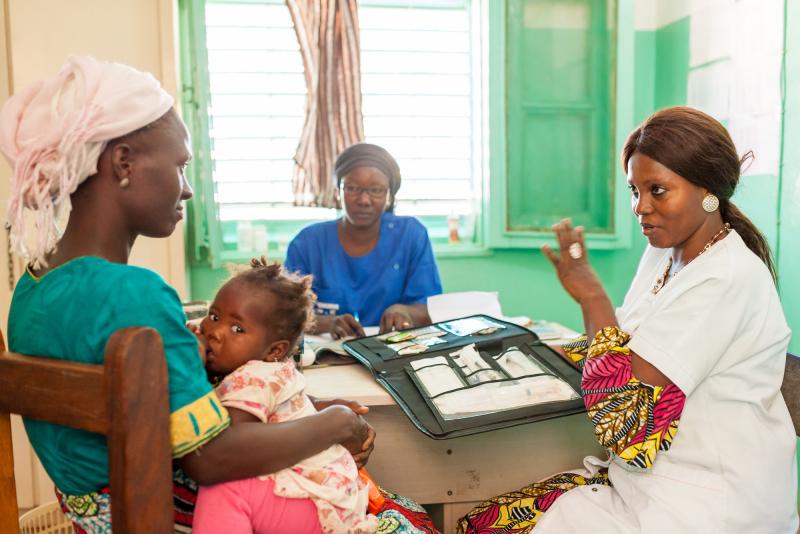Where We Work
See our interactive map


Health workers at Nemataba Health Center in Senegal's Kolda region discuss the array of family planning options with a mother who is breastfeeding. Photo by Clement Tardif for IntraHealth International.
With funding from the Bill & Melinda Gates Foundation, IntraHealth International has launched INSPiRE: Women's & Newborn Health, the third phase of a successful, cost-effective initiative to integrate health services in Francophone West Africa and save and improve the lives of mothers and babies. Providing a comprehensive package of essential health services—including family planning, nutrition, and maternal and infant care—during a single visit avoids missed opportunities and makes services more accessible, especially for women who live in rural and remote areas and must carry their babies long distances to reach a health facility.
The World Health Organization (WHO) promotes people-centered, integrated primary health care services to address unmet needs and promote universal access. Postpartum family planning has been identified as a priority high-impact practice to include as it presents one of the greatest opportunities to increase modern contraceptive use and reduce unintended pregnancies and pregnancies that are too closely spaced, which are associated with increased maternal, newborn, and child morbidity and mortality.
“The INSPiRE initiative has already helped double new family planning users and triple uptake of postpartum family planning."
“The INSPiRE initiative has already helped double new family planning users, triple uptake of postpartum family planning, and nearly quadruple well-baby visits. But we have an unfinished agenda and opportunity for moms and babies,” says Marguerite Ndour, INSPiRE director. “We’re grateful for renewed funding and support from the Bill & Melinda Gates Foundation. This work is not only critical for progress in the region, but it’s also a model to achieve greater impact around the world."
INSPIRE III will further accelerate adoption of family planning methods and improve maternal and child health indicators by scaling up the integration of postpartum family planning; maternal, neonatal, and child health; and nutrition (PPFP-MNCH-N) services in the nine Ouagadougou Partnership countries, with potential to expand to other countries in West Africa.
INSPiRE began in 2017 in 11 centers of excellence in Burkina Faso, Côte d’Ivoire, and Niger. IntraHealth and partners worked with national stakeholders to design and develop the INSPiRE Integration Model for providing PPFP-MNCH-N services at all levels of the health system and during four critical entry points: antenatal care, delivery, postpartum care, and infant care. The model defines eight essential steps to introduce and scale up service integration including the training and mentoring of health workers.
During INSPiRE I and INSPiRE II IntraHealth and partners also:
“We leveraged the Ouagadougou Partnership and the Community of Practice for their regional convening power and potential for economies of scale across the nine countries,” says Robert Bambara, INSPiRE's monitoring, evaluation, and learning manager. “These countries are eager to improve maternal and child health, adapt successful integration models, learn from one another, and hold one another accountable.”
“We leveraged the Ouagadougou Partnership and the Community of Practice for their regional convening power and potential for economies of scale."
Governments, implementers, and donors in the region have aligned around the INSPiRE integration model, and it is now being implemented in 607 health facilities in eight of the nine Ouagadougou Partnership countries: Burkina Faso, Côte d’Ivoire, Guinea, Mali, Mauritania, Niger, Senegal, and Togo. More than 95% of these health facilities are located in rural and disadvantaged areas.
Between 2019 and 2023, INSPiRE saw an overall 123% increase in new family planning users, a 275% increase in postpartum family planning use at supported health facilities, and a 380% increase in well-baby visits for growth monitoring. Among the children who were monitored, fewer than 1 child in 100 presented with acute malnutrition in 2023.
The biggest challenge is the lack of financial resources, and many competing financial demands. However, progress has been made in mobilizing resources and in aligning technical and financial partners to support scale-up of the Integration Model. Under the impetus of the CoP and the support of INSPiRE, the six countries with PAGE plans have already mobilized more than 10 billion West African francs ($16 million) and are organizing national roundtables to continue resource mobilization and further engage stakeholders to fill gaps.
Over the next four years, INSPiRE III will drive additional scale-up and impact of integrated client-centered services in the region by:
INSPiRE is funded by the Bill & Melinda Gates Foundation. Partners on INSPiRE I and II included Helen Keller International, PATH, and Institut de Recherche en Sciences de la Santé (IRSS). Partners on INSPiRE III include IRSS.



